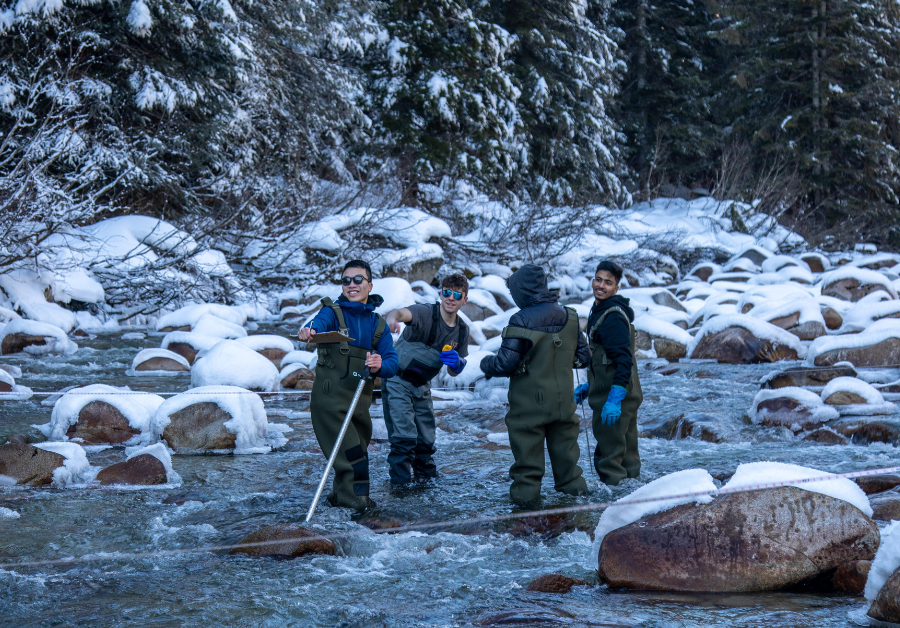
Students in Geography 207 - Hydrology course test water flow in the Shames Mountain Watershed in 2024.
Northwest BC – Outdoor enthusiasts with an interest in science now have a new opportunity at Coast Mountain College. Starting in September 2025, the Mountain Adventure Science (MAS) Certificate offers learners the opportunity to advance their outdoor education or prepare for a career in this field.
The one-year certificate is an immersive science program designed to blend adventure with experiential, field-based learning. The curriculum, which emphasizes community-based projects and field studies, prepares students for environmental technician positions in Indigenous fisheries and management offices, environmental consulting firms, outdoor tourism businesses, the provincial government, and elsewhere.
If they wish, graduates from the MAS program can enter a second-year of university studies, as all courses in the MAS certificate ladder into the Environmental Geoscience Diploma program at CMTN. Alternatively, students who successfully complete the certificate can transfer to a four-year degree program at a BC university. Related fields of further study include climate change, recreation, biology, geography, geoscience, environmental studies, anthropology, tourism, and education.
Program instructor Dr. Matthew Beedle describes the program as ideal for those interested in learning about and exploring the unique natural environment of Northwest BC. “MAS is a novel approach to coursework, in that we immerse students in their learning, whether in an applied project on-campus or in multi-week, adventurous field schools where we are out on the land learning from each other and the amazing natural environment of Northwest BC.”
Dean of University Credit, Sciences, Health, and Social Services Dr. Kara Loy adds, “This program will suit students who are interested in science and love to move and challenge themselves in the outdoors, enjoying and exploring Northwest BC.”
Learners will also gain leadership and collaboration skills, engage in professional communication with scientific communities, and incorporate Indigenous ecological knowledge in their studies and work.
“MAS builds on the current first-year Environmental Geoscience Program,” says Beedle, “with additional field-based learning and a range of academic fields that are relevant for work in our region.” These related fields include biology, geology, geography, and anthropology.
The program also combines certifications that match qualifications required by employers of field-based technician positions such as wilderness first aid, swift water rescue, and avalanche training.
Beedle adds that the development of MAS included guidance from the external Program Advisory Committee, which is comprised of leaders in the region in Indigenous fisheries management offices, environmental consulting firms, and industry partners.
“The regional employers told us the skills and knowledges they look for in their new employees and we worked these learning outcomes into the program,” says Loy.
Interested students are encouraged to contact instructor Dr. Matthew Beedle (mbeedle@coastmountaincollege.ca). Students may also reach out to the academic heads of the University Credit Program Gordon Weary (gweary@coastmountaincollege.ca), or Dr. Catharine White (cwhite@coastmountaincollege.ca).
Educational Advisors can help you with course selection. Contact us today to learn more: info@coastmountaincollege.ca.
###
Media Contact:
Heather Bastin
Executive Director, External Relations
hbastin@coastmountaincollege.ca